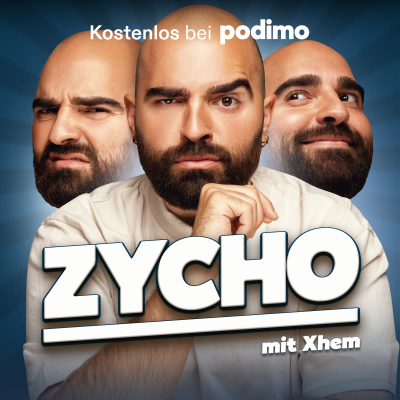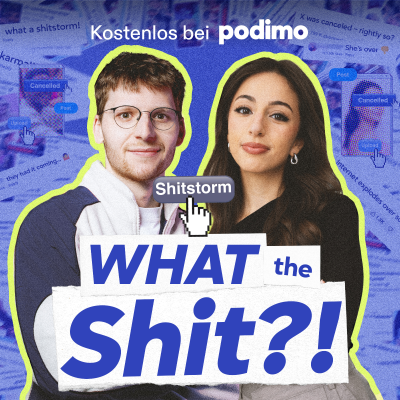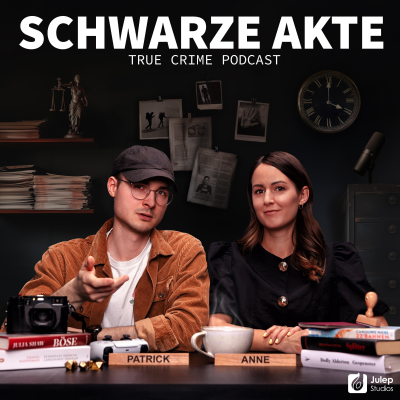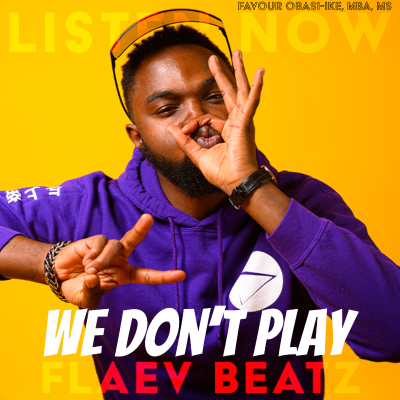
We Don't PLAY! Digital Online Marketing SEO Podcast: Monetize Pinterest AI Tactics for Businesses
Podcast von Favour Obasi-Ike: Digital Marketing, AI, Search Engine Optimization Savvy Pinterest Expert
Nimm diesen Podcast mit
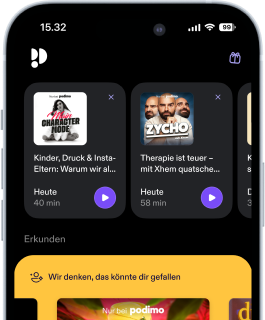
Mehr als 1 Million Hörer*innen
Du wirst Podimo lieben und damit bist du nicht allein
Mit 4,7 Sternen im App Store bewertet
Alle Folgen
561 FolgenWe Don't PLAY Podcast 🥳 Turns 6 Years Today: 6 Critical Podcast Wisdom Lessons Favour Obasi-Ike [https://www.linkedin.com/mynetwork/discovery-see-all/?usecase=PEOPLE_FOLLOWS&followMember=favourobasiike] Learned | Get exclusive SEO newsletters in your inbox. [https://workandplayentertainment.myflodesk.com/seo-marketing-strategy-zoom-call] In an insightful address, Favour Obasi-Ike marks his sixth anniversary by sharing six crucial lessons learned from his journey, emphasizing the importance of overcoming initial setbacks, dedicating sufficient time to content creation, and conducting thorough research to understand audience needs. He also highlights the evolving landscape of digital visibility, stressing that analytics are vital for understanding audience engagement and that a podcast should be viewed as an intangible asset to be protected and leveraged. NEWS UPDATE: Upcoming workshops focused on SEO, AI, LinkedIn, Pinterest, and podcasting will start soon to provide practical guidance, reinforcing the idea that consistent effort and strategic distribution are key to online success. Sign Up Here. [https://workandplayentertainment.myflodesk.com/seo-marketing-strategy-zoom-call] FAQs about this 6 years celebratory podcast 1. What is the significance of "We Don't PLAY Podcast" celebrating six years, and what has been its growth trajectory? The "We Don't PLAY Podcast" is celebrating six years of consistent podcasting, a significant milestone given that many podcasts stop within 6-8 weeks. The podcast, which started on August 12, 2019, has published over 550 episodes, with an additional 200 unreleased episodes, demonstrating a remarkable output over its six-year run. Initially, the podcast was a solo endeavor, but it evolved to include guest interviews as the host realized the demand for diverse voices. The podcast's reach is truly global, currently being streamed in over 151 countries. This expansion highlights the power of consistent content creation and strategic distribution. The host also noted a significant increase in downloads after transitioning to a new hosting platform, achieving 1,000 downloads in just 10 days, a number that previously took much longer on their old platform. This growth signifies the podcast's increasing authority and audience engagement. 2. What are the key marketing lessons learned over six years of podcasting? Favour shared six crucial lessons learned over six years of podcasting: * Embrace "No": Rejections or initial setbacks, including internal doubts, should be seen as opportunities for reflection and innovation, prompting a re-evaluation of strategies to achieve a "yes." This was personally experienced when the podcast's initial concept and name, "Play Flaev," failed due to copyright issues with incorporating music, leading to the creation of "We Don't PLAY." * Take Your Time: Consistency and quality are paramount. Building a podcast takes time and dedication. The host emphasizes investing quality time in content creation to reciprocate the time listeners invest, highlighting that most podcasts fail within the first two months due to a lack of sustained effort. * Do Your Research: Understand your audience and their needs. Researching topics that people want to hear about, whether through direct conversations or AI tools like ChatGPT, ensures that the content is relevant and valuable. This allows for the creation of episodes that directly address audience interests. * More People Want Their Voices Heard: There's a high demand for platforms where individuals and businesses can share their stories and expertise. Recognizing this led the host to invite guests to the show, shifting from a solo format to a collaborative one, which significantly broadened the podcast's appeal and content diversity. * Leverage Analytics: Podcast analytics are your best friend. They provide crucial data on who is listening, where they are located (countries, cities, states), and what content resonates with them. This information is vital for informed content production, targeted advertising, and building a deeper connection with the audience. * Treat Your Podcast as an Intangible Asset: A podcast is more than just audio content; it's an intellectual property. It can be trademarked and even turned into an NFT, signifying its value as a business asset. Protecting this asset is crucial for long-term growth, investor engagement, and potential licensing opportunities. 3. How does Favour Obasi-Ike view podcasting as a marketing tool, particularly for businesses? Favour considers podcasting to be one of the most effective and lowest-effort, highest-impact marketing tools available. The core idea is that by simply speaking on topics you are knowledgeable about, the audio content can be repurposed into various forms of digital content, such as LinkedIn posts, emails, website articles, and online publications. This "talk-to-text" conversion maximizes content reach with minimal additional effort. For businesses, podcasting offers a unique way to build authority, reach a global audience, and generate demand for products or services. The long-term nature of podcasting also allows for consistent content creation that continuously feeds the internet, contributing to better search engine visibility. 4. What is Favour's background, and how has it influenced their approach to podcasting and media? The speaker, Favour Obasi-Ike (also known as Flaev Beatz), has a rich and extensive background in media and communications, spanning decades. He is a drummer, writer, songwriter, producer, and music composer, with experience in screenwriting for various media. His musical background is particularly influential, as he self-composes and produces the jingles and music heard in his podcast episodes, often in as little as 30 minutes, due to his quarter-century experience in music and entertainment. This deep understanding of audio and its psychological impact on listeners led him to choose audio as his primary medium for high-impact, low-effort content creation. His long history in the digital audio space, dating back to 2005 with his music releases, underscores his commitment and expertise in the realm of sound and digital distribution. 5. What are the upcoming workshops, and what will they cover? To celebrate six years of podcasting and provide valuable insights, Favour is offering a series of four virtual workshops, each 90 minutes long, over four days. These workshops are designed to provide practical, visual guidance on key digital marketing strategies: * SEO + AI Workshop: This session will focus on how to optimize websites and podcasts to appear prominently on search engines (Google, Bing) and AI platforms (ChatGPT, Perplexity). It will cover correct positioning of intellectual property to ensure discoverability and impact, including real-time demonstrations of how content ranks. * LinkedIn Workshop: This workshop will teach participants how to effectively use LinkedIn for professionalism and intentional online presence, particularly for those with podcasts or businesses. * Pinterest Workshop: This session will delve into leveraging Pinterest for business and content visibility. * Podcasting Workshop: This dedicated workshop will provide in-depth strategies and tactics for starting, growing, and optimizing a podcast. These workshops are aimed at helping individuals and businesses understand and implement effective online strategies for growth and visibility. 6. Why is podcast distribution crucial, and what is an RSS feed's role in it? Podcast distribution is highlighted as the most impactful aspect of growing a show. The RSS (Really Simple Syndication) feed is the unique identification code for a podcast, acting like its "domain" or "USB" storage. Each episode uploaded adds to this "database" on the server. When a podcast's RSS feed is submitted to various podcasting platforms (like Apple Podcasts, Spotify, iHeartRadio, Amazon, Pandora, and many others – potentially over 40 available platforms), each platform creates an individual link for every episode. This means a single piece of uploaded audio content is automatically distributed to numerous "stations" or "franchises" across the internet. This widespread distribution ensures that: * Global Reach: Content becomes accessible in a multitude of countries and regions. * Increased Discoverability: More links in different locations mean more opportunities for listeners to find the podcast through various search engines and directories. * Leveraged Data: Analytics from these diverse platforms provide insights into audience demographics and listening habits, enabling producers to tailor future content and target advertising more effectively. In essence, a robust distribution strategy, powered by the RSS feed, multiplies the reach and impact of each podcast episode, leading to increased downloads and audience engagement over time. Digital Marketing SEO Resources: >> Join our exclusive SEO Marketing community [https://workandplayentertainment.myflodesk.com/seo-marketing-strategy-zoom-call] >> SEO Optimization Blogs [https://www.playinc.online/newsfeed] >> Book Complimentary SEO Discovery Call [https://calendly.com/flaevbeatz/marketing-strategy-zoom-call] >> Subscribe to We Don't PLAY Podcast [https://wedontplaypodcast.com/] Brands We Love and Support Loving Me Beauty | Buy Vegan-based Luxury Products [https://www.lovingmebeauty.com/] Unlock your future in real estate—get certified in Ghana today! [https://payhip.com/b/IZgbd] See Privacy Policy at https://art19.com/privacy [https://art19.com/privacy] and California Privacy Notice at https://art19.com/privacy#do-not-sell-my-info [https://art19.com/privacy#do-not-sell-my-info].
How Do I Know If My Website Is Penalized by Google? Website Health & Technical SEO Masterclass with SEO Expert, Favour Obasi-ike, MBA, MS [https://www.linkedin.com/mynetwork/discovery-see-all/?usecase=PEOPLE_FOLLOWS&followMember=favourobasiike] | Get exclusive SEO newsletters in your inbox. [https://workandplayentertainment.myflodesk.com/seo-marketing-strategy-zoom-call] This extensive SEO audio provides an in-depth discussion on technical SEO and how businesses can identify and address Google penalties impacting their websites. Favour uses analogies like a car's engine or a leaking roof to explain complex concepts, emphasizing that a penalty often signals a need for correction and improvement, not failure. Key areas covered include website structure, content quality (thin vs. thick content), proper use of tags and categories, image optimization, video embedding, and leveraging Google Search Console for diagnostics. The conversation also touches on the distinction between manual and algorithmic penalties and offers practical advice, such as using search operators, to check website visibility and performance. Frequently Asked Questions 1. How can I tell if Google has penalized my website, and what does it mean? Google penalizes websites when they violate webmaster guidelines, often due to issues with content quality, relevance, or technical structure. A penalty means your site's search ranking is negatively affected, leading to reduced visibility and traffic. While a penalty might seem negative, it's actually an opportunity for correction and improvement, indicating that your site is at least visible enough for Google to notice. You might receive email notifications from Google, or you can check your Google Search Console for specific error messages and performance insights. 2. What are the two main types of Google penalties, and how do they differ? There are two primary types of Google penalties: * Manual Penalty: This occurs when a human reviewer from Google's web spam team flags your website for violating guidelines, often due to manipulative practices like spammy or hidden links ("black hat SEO"). These are rare but indicate a severe violation. * Algorithmic Penalty: This is far more common and happens automatically due to issues detected by Google's algorithms. Reasons can include outdated or "thin" content, low quality or irrelevant information, generic AI-generated content, unnatural links, or regurgitated content. These penalties lead to automatic demotion or removal from search results. 3. How does "thin content" contribute to Google penalties, and what makes content "thick"? "Thin content" refers to web pages that lack depth, context, or comprehensive information on a given topic. It's often characterized by a low word count, insufficient detail, and a lack of supporting elements. Google measures articles by reading time, word count, and character count. If your content is significantly shorter than the industry average for a similar topic (e.g., 300 words vs. 3,000 words), it's considered thin and unlikely to outrank competitors. "Thick content," conversely, is rich in information and provides a thorough exploration of a topic. To create thick content, you should: * Expand on topics: Go beyond basic definitions, offering more context and depth. * Include various elements: Incorporate images (optimized for size), embedded videos (not uploaded), audio clips, statistics, examples, comparison charts, quotes, listicles, proper formatting (headings, links), and frequently asked questions (FAQs). * Answer user intent: Ensure your content directly addresses the questions and needs of your target audience. 4. Why is connecting my website to Google Search Console crucial for identifying and resolving penalties? Google Search Console (GSC) is the primary tool Google provides for website owners to monitor their site's performance in search results and identify issues. Connecting your website to GSC is the first essential step because it allows Google to communicate error messages and indexing problems directly to you. Within GSC, you can view performance insights, check the "Pages" section under "Indexing" to see which pages are known, submitted, or unsubmitted, and understand why certain pages might not be indexed. This diagnostic information is vital for understanding the root causes of any penalties and guiding your corrective actions. 5. What are common technical SEO issues that can lead to Google penalties, beyond content quality? Technical SEO issues relate to the structural and operational aspects of your website that affect how search engines crawl and index it. Common problems include: * Website size and image optimization: Large file sizes, especially for images and uploaded videos, can slow down your website, leading to a poor user experience and penalties. Use compression tools (e.g., compressor.io) for images and embed videos instead of uploading them. * Broken or inaccessible links: Ensure all links within your sitemap and across your site are functional and lead to valid destinations. * Incorrect robots.txt or "no index" tags: The robots.txt file and "no index" meta tags tell search engine robots which pages to crawl or not to crawl. Accidentally blocking important pages (a common default issue with platforms like Wix for blog tags) can prevent Google from indexing your content. * Outdated website structure: An inefficient or poorly organized website structure can hinder crawlability and overall performance. * Slow loading times: Directly linked to website size and optimization, slow loading speeds can negatively impact user experience and search rankings. 6. What's the recommended first step for a business owner who suspects their website is penalized by Google? The immediate first step is to connect your website to Google Search Console (GSC) if you haven't already. 1. Go to google.com and search for "Google Search Console." 2. Click on the official Google Search Console Tools link. 3. Click "Start Now." 4. If your site isn't connected, GSC will provide a unique verification code (often a TXT record). 5. Go to your domain name server (DNS) settings within your website hosting provider's control panel. 6. Add the provided TXT record to your DNS settings. 7. Return to GSC and click "Verify." A green bar indicates successful connection. Once connected, GSC will begin providing insights into your site's performance, indexing status, and any specific error messages or penalty notifications, allowing you to diagnose and address issues effectively. Digital Marketing SEO Resources: >> Join our exclusive SEO Marketing community [https://workandplayentertainment.myflodesk.com/seo-marketing-strategy-zoom-call] >> SEO Optimization Blogs [https://www.playinc.online/newsfeed] >> Book Complimentary SEO Discovery Call [https://calendly.com/flaevbeatz/marketing-strategy-zoom-call] >> Subscribe to We Don't PLAY Podcast [https://wedontplaypodcast.com/] Brands We Love and Support Loving Me Beauty | Buy Vegan-based Luxury Products [https://www.lovingmebeauty.com/] Unlock your future in real estate—get certified in Ghana today! [https://payhip.com/b/IZgbd] See Privacy Policy at https://art19.com/privacy [https://art19.com/privacy] and California Privacy Notice at https://art19.com/privacy#do-not-sell-my-info [https://art19.com/privacy#do-not-sell-my-info].
What's the Fastest Way to Get Webpages Indexed (Technical SEO) by Search Engines? with SEO Expert, Favour Obasi-ike, MBA, MS [https://www.linkedin.com/mynetwork/discovery-see-all/?usecase=PEOPLE_FOLLOWS&followMember=favourobasiike] | Get exclusive SEO newsletters in your inbox. [https://workandplayentertainment.myflodesk.com/seo-marketing-strategy-zoom-call] This episode focuses on search engine optimization (SEO) and the fastest ways to get indexed by search engines, extending beyond just Google to include other platforms and AI-powered large language models (LLMs) like ChatGPT emphasizing that building trust with search engine algorithms is paramount, achieved through consistent content creation, linking strategies (backlinks), and connecting websites via tools like Google Search Console. Favour highlights the importance of updating existing content and addressing user queries to improve visibility across various search and AI platforms, ultimately advocating for a strategic and patient approach to online presence rather than solely focusing on a single ranking metric. AD BREAK: Get 20% off your first booking & be the first to know about our new arrivals, spa deals, and events with Somatic Massage [https://somaticmassagepc.com/] Frequently Asked Questions about Search Engine Indexing and Online Presence What is the fastest way to get indexed by search engines? The fastest way to get indexed by search engines is by building trust and establishing connections. This means having conversations around the questions people are asking and providing answers in the form of website links. These links should then be shared on other reputable websites to create backlinks, which signal to search engines that your website has authority. It's not just about creating a lot of content, but about creating relevant, high-quality content that answers user queries and is linked to by trusted sources. Why isn't my website ranking on search engines? There are several reasons why your website might not be ranking. Common issues include not having your website manually indexed or automatically discovered by search engines, or not being connected to Google Search Console. Additionally, your content might not be seen if it's not frequently updated, as AI servers and search engines prioritize recently modified content. A lack of engagement and underutilization of your website compared to time spent on social media can also hinder its visibility. Essentially, if search engines aren't "seeing" your content, they can't recommend it. How long does it take for SEO efforts to show results? Ranking SEO web pages on Google and other search engines takes time and consistency. While immediate indexing can occur within hours or days for consistent posters, significant milestones, such as receiving your first 10 clicks, can take around six months, even with hundreds of articles. The key is consistent effort, building trust with algorithms, and maintaining an active online presence. The compound effect of consistent content creation can lead to substantial impressions over time. How does trust factor into search engine ranking? Trust is paramount for search engine ranking. Just as in human relationships, search engines, particularly Google, rely on trust to refer content. This trust is established when other third-party websites, which Google already trusts, link to your website, thereby vouching for your site's authority. These "off-page SEO referring domains" (like links on Reddit, Trustpilot, LinkedIn, Pinterest) may have varying impact, but they contribute to your credibility and signal to search engines that your content is valuable and reliable. Is traditional SEO still relevant with the rise of AI and Large Language Models (LLMs) like ChatGPT? Yes, traditional SEO is still very relevant and, in fact, synergistic with AI and LLMs. While AI provides generative answers, it often sources its information from traditional search engines like Google. Therefore, optimizing your content for Google through good SEO practices (like answering frequently asked questions, using appropriate keywords, and having a well-structured site map) directly contributes to your brand being cited and mentioned in AI-generated responses. AI and SEO are not competing but are interdependent, with AI leveraging the foundation built by strong SEO. How can I optimize my content for AI search engines? To optimize for AI search engines, focus on providing succinct, evidence-based answers to specific, question-based headings, similar to "People Also Ask" sections on Google. Ensure your content is frequently updated ("last modified" date is recent) as AI prioritizes fresh information. AI servers are looking for up-to-date, relevant context. By consistently creating and updating content that answers user queries and by connecting your website to search engines via tools like Google Search Console, you increase the likelihood of being sourced and mentioned by AI. What is the significance of a "sitemap" and "DNS" in getting indexed? A sitemap acts as a map of your website, providing search engines with a structured list of all your pages, products, and blogs. Submitting an updated sitemap is crucial for search engines to crawl and understand your site's content. DNS (Domain Name Server) is like your unique digital DNA for your website, confirming your ownership of the domain. Connecting your DNS record with a unique identification number (like a TXT record from Google Search Console) gives search engines access to your site's architecture, allowing them to effectively read and index your content. What is the difference between manual and auto-indexing, and how do they impact visibility? Manual indexing involves actively submitting your website or specific pages to search engines (e.g., through Google Search Console) to ensure they are discovered. Auto-indexing refers to the automatic discovery and crawling of your site by search engines over time due to consistent activity and established trust. While manual indexing provides an initial push, consistent content creation and updates increase your "crawl budget," leading to higher priority and more frequent auto-indexing. Both are important; consistent manual effort eventually leads to more efficient auto-indexing and better long-term visibility. Digital Marketing Resources: >> Join our exclusive SEO Marketing community [https://workandplayentertainment.myflodesk.com/seo-marketing-strategy-zoom-call] >> SEO Optimization Blogs [https://www.playinc.online/newsfeed] >> Book Complimentary SEO Discovery Call [https://calendly.com/flaevbeatz/marketing-strategy-zoom-call] >> Subscribe to We Don't PLAY Podcast [https://wedontplaypodcast.com/] Brands We Love and Support Loving Me Beauty | Buy Vegan-based Luxury Products [https://www.lovingmebeauty.com/] Unlock your future in real estate—get certified in Ghana today! [https://payhip.com/b/IZgbd] See Privacy Policy at https://art19.com/privacy [https://art19.com/privacy] and California Privacy Notice at https://art19.com/privacy#do-not-sell-my-info [https://art19.com/privacy#do-not-sell-my-info].
Why Are My Digital Marketing SEO Efforts Not Working? with SEO Expert, Favour Obasi-ike, MBA, MS [https://www.linkedin.com/mynetwork/discovery-see-all/?usecase=PEOPLE_FOLLOWS&followMember=favourobasiike] | Get exclusive SEO newsletters in your inbox. [https://workandplayentertainment.myflodesk.com/seo-marketing-strategy-zoom-call] This Clubhouse session features offering advice on Search Engine Optimization (SEO), particularly for small businesses. Favour explains that effective SEO involves consistent effort and strategy, likening it to a conversation where businesses answer frequently asked questions. He suggests creating diverse content formats, like long-form "pillar" blog posts supported by shorter "cluster" content, and emphasize the importance of localizing content for brick-and-mortar businesses. The discussion also touches upon tools like Semrush and Ahrefs for SEO analysis, while advocating for a "mindset, skillset, toolset" approach to digital marketing, stressing that understanding fundamental principles and consistent application are more crucial than expensive tools alone. Favour illustrates concepts with real-world examples and interactive exercises, encouraging listeners to apply the strategies themselves to improve their online presence and drive organic traffic. AD BREAK: Get 20% off your first booking & be the first to know about our new arrivals, spa deals, and events with Somatic Massage [https://somaticmassagepc.com] Frequently Asked Questions 1. Why aren't my SEO efforts working, and what's the fundamental issue? SEO efforts often fall short due to a lack of consistent strategy and the failure to address user intent directly. The core problem is not "showing up for a term" because the relevant link or content isn't "activated." This means your content isn't directly answering the questions people are frequently asking online or isn't positioned to be easily seen by search engines. Expecting different results from repeating the same ineffective actions is likened to "insanity." Effective SEO, at its heart, is a conversation where your content provides clear, direct, and valuable answers to user queries, similar to how a meaningful conversation builds understanding and leads to further engagement. 2. How can I effectively create content for SEO in 2025? The primary goal for content creation in 2025 is to answer frequently asked questions online and establish yourself as the authoritative "person of interest" providing those answers. This transforms SEO into a conversation. To achieve this, focus on creating content that directly addresses user queries. For instance, if the most searched question of 2024 was "What time is it?", then providing a direct answer makes you the "respondent to the answer." This content can be distributed through various formats, with podcast episodes and blogs being the fastest ways to publish. Consistency is key, with a suggested minimum of 10 minutes to 10 hours per week dedicated to content creation. 3. What is the "pillar and cluster" content strategy, and how does it improve SEO? The "pillar and cluster" strategy involves creating a comprehensive "long-form" piece of content (the pillar) that covers a broad topic in depth, acting as a foundational resource. This pillar can include comparisons, statistics, infographics, videos, listicles, charts, and FAQs. Subsequently, you create "mid-form" and "short-form" content pieces (the clusters) that delve into more specific sub-topics or variations derived from the pillar. These clusters link back to the main pillar, creating a strong internal linking structure. This method allows you to cover a topic from multiple dimensions, compound your SEO interest, and establish semantic connections across your website. Each published blog can generate numerous new "keywords" or "seeds," further expanding your content ecosystem. 4. How does updating old content contribute to better SEO, and what is a "last modified page"? Regularly updating old content is a powerful SEO tactic. When you update an existing article, especially with current information (e.g., changing "2025" to "2026"), it signals to search engines that your content is fresh and relevant. This updated page becomes a "last modified page," which AI algorithms prioritize and pick up more readily from the internet. The concept is that an active website with recently updated content is more likely to rank higher. By updating older posts and linking them to newer ones, you create a dynamic "spiderweb" of content, ensuring your website always appears "on" and active, leading to improved rankings and longevity. 5. Are SEO tools like Semrush and Ahrefs crucial for a comprehensive hyperlocal SEO strategy, and are there free alternatives? While tools like Semrush and Ahrefs are excellent for comprehensive analysis, especially for hyperlocal strategies (e.g., checking Name, Address, Phone number consistency across directories), they are not strictly necessary to get started or achieve results. These tools can be expensive, and it might be more cost-effective to hire a professional or agency if you're not committed to learning and consistently using them yourself. For free alternatives and effective strategies, Google itself is your "best friend." You can use Google Search Console to identify search phrases and even leverage specific "search operators" (like blog/ [keyword]) to discover articles people are already finding. This allows you to identify topics and competitors for which you need to create your own content. Ensuring consistent "Name, Address, Phone number" (NAP) information across all online directories (Yellow Pages, Yelp, Google Business Profile, etc.) is crucial for local businesses, as inconsistencies can raise "red flags" with Google. 6. How does consistency in business information and brand identity impact SEO? Consistency in business information and brand identity is paramount for SEO and overall online visibility. Just as a credit report requires matching details, search engines, particularly Google, look for consistent "Name, Address, Phone number" (NAP) across all online directories and platforms (social media, review sites, business listings). Inconsistencies or typos can confuse search engines, making it difficult for them to verify your business's legitimacy and location, leading to poor ranking. Beyond NAP, consistently presenting your brand name, author name for content, and overall messaging ensures that people recognize and trust your presence. This consistent "showing up with the same name" builds familiarity and reinforces your authority in your niche, proving to search engines and users that your brand is reliable and relevant. 7. How does the "mindset, skillset, toolset" framework apply to successful SEO efforts? Successful SEO, like any business endeavor, operates within a "mindset, skillset, toolset" framework. * Mindset: This refers to your approach and intention. It's about being proactive, understanding why your efforts might not be working, and being open to learning and adapting. It's about having the commitment to consistent action rather than expecting overnight results. * Skillset: This is the knowledge and ability to execute SEO strategies. This includes knowing how to research keywords, create content, optimize pages, and analyze data. While tools can assist, the underlying skill to interpret and act on information is crucial. * Toolset: These are the actual resources you use, whether paid SEO tools like Semrush, free Google tools like Search Console, or even basic search operators. The effectiveness of your tools depends on your skillset and mindset; a great tool is useless without the knowledge and consistent effort to wield it properly. Consistent "reps" across these three sets are essential for continuous improvement and achieving tangible SEO results. Digital Marketing Resources: >> Join our exclusive SEO Marketing community [https://workandplayentertainment.myflodesk.com/seo-marketing-strategy-zoom-call] >> SEO Optimization Blogs [https://www.playinc.online/newsfeed] >> Book Complimentary SEO Discovery Call [https://calendly.com/flaevbeatz/marketing-strategy-zoom-call] >> Subscribe to We Don't PLAY Podcast [https://wedontplaypodcast.com/] Brands We Love and Support Loving Me Beauty | Buy Vegan-based Luxury Products [https://www.lovingmebeauty.com/] Unlock your future in real estate—get certified in Ghana today! [https://payhip.com/b/IZgbd] See Privacy Policy at https://art19.com/privacy [https://art19.com/privacy] and California Privacy Notice at https://art19.com/privacy#do-not-sell-my-info [https://art19.com/privacy#do-not-sell-my-info].
How Long Does It Take to Rank SEO Webpages on Google & AI? with SEO Expert, Favour Obasi-ike, MBA, MS [https://www.linkedin.com/mynetwork/discovery-see-all/?usecase=PEOPLE_FOLLOWS&followMember=favourobasiike] The We Don't PLAY podcast host discusses how long it takes for SEO web pages to rank on Google and AI search engines, emphasizing that there's no single answer, ranging from days to months or even years depending on website history and consistent updates. I highlight the importance of submitting websites to Google Search Console, understanding domain and hosting, and strategically creating content that answers questions. They differentiate between Google's organic impressions and AI's "earned SEO"or earned impressions, underscoring that being visible on Google is a prerequisite for AI search visibility. The discussion also touches on content velocity, the value of a consistent online presence, and how to use tools and strategies to improve search engine optimization for both traditional and AI-driven searches. FAQs about this episode 1. How long does it typically take for a new webpage to rank on Google and AI search engines? For a brand new website or webpage, it generally takes around 3 to 6 months to start ranking significantly on Google and AI search engines. For an existing website or webpage, it can take days to weeks to significantly show up on Google and AI search engines. However, the speaker highlights a case where an article ranked in just two days. This rapid ranking is attributed to the website's existing credibility, similar to having a good credit score with a bank. Google and AI prioritize established entities. For entirely new content, especially if it's the first time a link has surfaced on the internet, it can even rank within 24 hours. The key takeaway is that it's a marathon, not a sprint, and consistent effort is crucial for long-term gains. 2. What are the foundational steps to ensure a website can even appear on Google and AI search results? Before any SEO efforts can be effective, your website needs to be visible to search engines. The first crucial step is to have a website that Google can "see." This involves submitting your website to Google Search Console, which acts as Google's internet service provider for your site. Without this submission, your website isn't connected to Google's internet, making it invisible to their indexing systems. Think of it like a book not being in a library's inventory; it can't be found. Additionally, your website needs proper hosting (e.g., WordPress, Hostinger, GoDaddy), as a domain alone isn't enough to make it a functional, searchable website. 3. How do traditional SEO and AI search results differ, and what does "earned SEO" mean in this context? The speaker distinguishes between traditional SEO and AI searches by introducing the concept of "earned SEO." Traditional SEO focuses on organic impressions, where your content naturally ranks based on relevance and quality. AI searches, on the other hand, are described as "earned impressions." This means that AI platforms like ChatGPT, Perplexity, and Grok look for the top results already showing up on Google. Therefore, if your website isn't ranking organically on Google in the first place, it's impossible for it to show up in AI search results. "Earned SEO" suggests that your presence and visibility on AI platforms are a consequence of having already "earned" strong organic rankings on traditional search engines. AI searches also have a shorter, often 24-hour, countdown timer for relevance, emphasizing rapid content updates and a broad presence across different platforms. 4. Why is consistent content updating and strategy crucial for long-term SEO success? SEO is not a one-time fix; it requires continuous effort. Google (and now AI) periodically "deletes" or de-prioritizes old, irrelevant content from its servers if it's not updated. The concept of "tokenization" refers to the duplicate copy of your webpage that Google remembers, and if this isn't refreshed, your content will lose visibility. Therefore, consistently updating existing articles (even minor edits) and publishing new content with a clear strategy and plan are vital. This continuous effort creates a "spiderweb" of interconnected content, signaling to search engines that your website is active, relevant, and authoritative. 5. What role does "content velocity" play in effective marketing and SEO? Content velocity refers to how quickly you can create and distribute relevant content across various platforms. Beyond just quality (answering questions and providing value), the speed at which you produce and share content significantly impacts your reach and ranking potential. Distributing content on platforms like Facebook, Pinterest, Clubhouse, LinkedIn, and various podcast directories (Apple Podcast, Spotify, Amazon Music) creates numerous backlinks and brand mentions. This widespread presence, coupled with consistent new content, signals authority and relevance to search engines, leading to increased visibility and better ranking opportunities over time. 6. How can businesses leverage diverse online platforms to enhance their search engine visibility? Businesses should aim for a multi-platform strategy to maximize their visibility. This includes having a robust website, a consistent podcast presence across various directories (Apple, Spotify, Amazon), an active social media presence (Facebook, LinkedIn, Pinterest, TikTok), and engaging email marketing. Each of these platforms, when properly optimized with relevant content and clear calls to action (like linking back to your website), contributes to a stronger online footprint. For example, a podcast episode appearing on 10 different directories means 10 backlinks to your website, significantly boosting its authority and discoverability. The more widely your brand is mentioned and linked, the more search engines trust and prioritize your content. 7. What are "commercial blogs" and why are they becoming increasingly important in the age of AI-powered search? Commercial blogs are informational content designed to answer specific user queries that have a commercial intent, even if indirectly. The speaker emphasizes that while general informational questions like "What time is it?" are common, the trend is moving towards more specific queries, often posed to AI assistants or search engines, that imply a need for a product or service ("What are the best shoes to get in this store?"). If your business isn't creating content that directly or indirectly answers these commercially oriented questions, you risk being "off the radar." The goal is to create content that not only provides value but also subtly guides users towards your offerings, making your website a source for solutions that lead to conversions. 8. What does "your voice is your invoice" mean in the context of online presence and business growth? "Your voice is your invoice" encapsulates the idea that actively putting out your expertise and value in the online sphere directly leads to financial reward. This "voice" isn't just speaking aloud; it includes all forms of content creation: social media posts, website content, emails, and participation in online discussions (like speaking on Clubhouse stages). By consistently providing value and answering questions through your content, you gain recognition, establish authority, and attract your ideal audience. The more you "speak up" and share your knowledge, the more you get "paid" in terms of leads, clients, and revenue. It also serves to repel those who are not a good fit, allowing you to focus your efforts on genuine opportunities. Digital Marketing Resources: >> Join our exclusive SEO Marketing community [https://workandplayentertainment.myflodesk.com/seo-marketing-strategy-zoom-call] >> SEO Optimization Blogs [https://www.playinc.online/newsfeed] >> Book Complimentary SEO Discovery Call [https://calendly.com/flaevbeatz/marketing-strategy-zoom-call] >> Subscribe to We Don't PLAY Podcast [https://wedontplaypodcast.com/] Brands We Love and Support Loving Me Beauty | Buy Vegan-based Luxury Products [https://www.lovingmebeauty.com/] Unlock your future in real estate—get certified in Ghana today! [https://payhip.com/b/IZgbd] See Privacy Policy at https://art19.com/privacy [https://art19.com/privacy] and California Privacy Notice at https://art19.com/privacy#do-not-sell-my-info [https://art19.com/privacy#do-not-sell-my-info].

